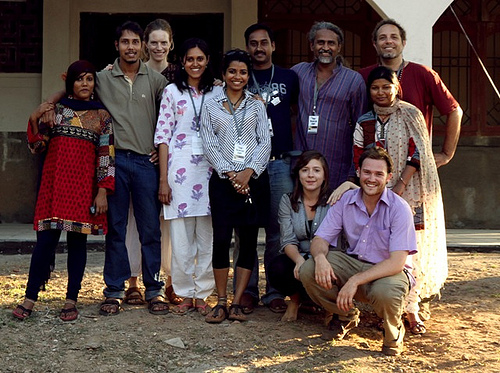In my experience working in an Indian company, I quickly discovered there were a lot of voices I needed to listen to.
There was my reporting manager who kept an eye on me and who was looking for me to make a big difference in the company. There was the subject expert who had built up a reputation for being great at the work I was now doing. And there was the visionary leader who was more focused on the company reputation but also involved in day-to-day operations.
Each one was helpful in her own way. (All three were women.) Each one wanted to give guidance and oversight. Each one wanted to show she cared, but also demanded certain respect. Each one wanted to be the voice of reason and direction.
I remember the day it dawned on me that I had three mothers. And I was having trouble keeping all of them happy. I could usually keep 2 out of 3 of them in good spirits, but like the elusive Triple Crown, I was never able to complete the circuit.
Thinking about these three “influencers” as mothers started me thinking about what leadership looks like in a culture like India that is very hierarchical (#PowerPlays) and very group oriented (#See1See100). When these two forces come together, you find the Parent style of leadership.
What is a Parent Leader?
A Parent Leader (also called paternalistic leadership) is a phrase used to describe a certain style of leadership that is common in Asia, the Middle East, and Latin America (or about 67% of the world’s population), but specifically seen in India, China, Turkey, and Korea.
As the name implies, a Parent Leader leads as if they were the parent of their subordinates. Gül Selin Erben and Ayşe Güneşer describe it as having at the same time a controlling and caring attitude. Zeynep Aycan says is it when a superior offers both professional and personal guidance and protection in exchange for loyalty and deference. It is not simply authoritarian, but authority with a long-term vested interest in all the members at play.
Erben and Güneşer say,
“In the paternalistic exchange between the leader and the followers, the leader provides a holistic concern for the followers and their families in exchange for unquestioned obedience and loyalty on the part of the followers.” (957)
Bor-Shiuin Cheng has identified three essential factors to identifying the Parent Leader Style:
1.) Authority – The authority of the leader is absolute and complete. Once they say something, it is final. Subordinates should obey unquestionably.
2.) Benevolence – The leader takes an individualized, holistic concern for each person on the team, as well as their family.
3.) Moral Leadership – The leader tries to model behaviors and virtues that he/she intends for the rest of the family to emulate and accept as their own values.
How does a Parent Leader act?
A Parent Leader leads the organisation/team like they are a family. A family is a close-knit group of people with a pre-defined authority structure. Parent Leaders see all the people on the team as their children that need protection, guidance, and advice, both in the office and outside it. If your kid has the chicken pox, a Parent Leader will want to know and find a way to help. If you are hosting a housewarming party, your Parent Leader is sure to show up.
A Parent Leader wants to deeply respect the past while thinking through the legacy they will leave in the future. The parent leader is not as much concerned with quarterly results as how the organisation will be known in a hundred years. In India, their role models are the Tatas, Ambanis, Birlas, etc. They care not just about their “brand image”, but the true reputation of the organisation.
A Parent Leader values loyalty above all other characteristics. You don’t have to be the smartest person in your industry, but you had better be the most loyal. Parent Leaders have little time for hotshots who come in and think they are great but are ready to jump ship for a better offer. They would much prefer someone who, when the ship starts to sink, will tie themselves to the mast. Conversely, nothing will destroy the trust of the Parent leader faster than any attempt that smells of disloyalty.
A Parent Leader expects all team members to be available “on demand”. A team member’s loyalty is tested by how fully they meet the leader’s needs once they arise. “You weren’t there for me when I needed you!” is never something you want to hear from a Parent Leader. If there is an emergency where the organization is at stake, you are expected to be there even at the expense of your personal life. (The Parent Leader will patch things up afterward if needed.)
A Parent Leader makes decisions based on intuition. This is a “Father/Mother knows best” situation. They know what worked in the past and they hate it when their “gut feeling” is challenged. The phrase “just trust me” is often used as a way to end discussions.
A Parent Leader prefers things to be done “their way”. The Parent Leader places an extremely high value on “the way we used to do it/always have done it”. For the Parent Leader, the past is often frozen in a beautiful, perfect (or at least good-enough) picture. Too much newness threatens who we are as an organisation. There is also a strong spoken or unspoken “code of ethics” which is “the way we do things around here”.
A Parent Leader hates feeling left out of what is going on in the organisation. There is nothing worse than seeing the face of a Parent Leader when they are told about something after the fact. They don’t mind getting involved in the minutia. They would prefer to know too much than not enough.
A Parent Leader delegates duties, but not authority. The Parent Leader holds the final authority and while they will expect others to do their part, in the end the Leader thinks it is unfair to force someone else to be accountable for what goes on in their team. Parent Leader will from time to time swoop down and tell a senior manager step by step how to do something – to the extent of writing an email word-for-word for them.
Sound like someone you know?
Once I was able to identify the Parent Leaders that I was working with, it became much more clear to me why we were having friction and what I could do to improve the situation.
The pervasiveness of Parent Leadership in India is shocking to the outsider, and you will not get far without a healthy understanding of its implications. Most Indians grow up in a family and education system that sets them up for this kind of leadership in the business world.
Over the next few months, we will examine several topics around the Indian office that can be seen more clearly through the lens of Parent Leadership.
Stay tuned for:
- How to work for a Parent Leader
- How to Lead in a Family Style
- How Parent Leadership affects attrition, organisational structures, delegation, decision making, and many more topics
More on Parent Leadership, On the Job
Photo Credit: Video Volunteers(VV) on Flickr





